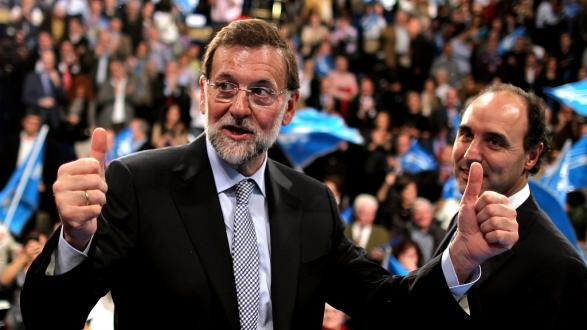In:
Global Beat is your weekly stop for news from around the world. Join us every Friday morning for important stories you should know about.
This week, Spain has a new government after 10 months; tensions continue to escalate between India and Pakistan over the Kashmir region; Cuba fails to meet its foreign investment goal; and more.
____________________
Americas
Cuba’s Foreign Commerce Minister Rodrigo Malmierca told foreign business leaders Tuesday that the island nation is failing to meet its self-imposed foreign investment target of $2 billion. Only $1.3 billion have been approved in the two years since a law aimed at boosting foreign investment was passed, Malmierca said at the country’s annual international trade fair. Despite President Obama’s efforts to normalize relations with Cuba, formal trade between the two countries remains minimal. U.S. business executives said red tape and slow approvals from Washington and Havana make it hard to do business in Cuba.
Also check out:
- Colombia making ‘substantial progress’ with peace deal, says President Santos – Helen Reid, Reuters
Central & South Asia
Pakistan withdrew six diplomats from India as tensions continue to escalate between the two countries over the Kashmir region. The withdrawal comes after the Indian government arrested and expelled a Pakistani diplomat on charges of espionage, which then triggered a "tit for tat" expulsion of an Indian official from the embassy in Pakistan. Pakistani officials also announced that they have uncovered an extensive spy network operating out of the Indian embassy. Local press revealed the names of eight alleged Indian spies, who are accused of carrying out subversive and destabilizing activities in Pakistan.
Also check out:
- A humanitarian crisis looms in Afghanistan as the number of displaced climbs – Erin Cunningham, Washington Post
China & East Asia
Chinese President Xi Jinping and Taiwanese opposition leader Hung Hsiu-chu met in Beijing, signaling to Taiwan’s pro-independence administration that they will lose access to China’s most powerful officials if they do not accept the "one-China principle." China ceased communications with Taiwanese President Tsai Ing-wen several months ago, and has barred Taiwan’s representatives from international meetings. Taiwan’s Nationalist opposition party and China’s ruling Communist party have historically been enemies, but have recently found common ground in opposing Taiwanese independence.
Also check out:
- Separatist Hong Kong lawmakers draw blunt response from China – Michael Forsythe and Alan Wong, The New York Times
Europe & Russia
Spain’s 10-month long period without a government came to a close Monday as Mariano Rajoy was sworn in as prime minister. Rajoy will lead a minority government presiding over a heavily fractured parliament and will face the immediate challenges of passing a budget and managing Spain’s deficit. To do this, economists say that Prime Minister Rajoy must either raise taxes or cut spending, both bound to be unpopular with Spanish citizens. The new prime minister also faces protests over his party’s past corruption scandals and a mounting separatist movement in the northeastern region of Catalonia.
Also check out:
- Court rules that parliament must vote on whether the UK can start the process of leaving the EU – BBC
Middle East & North Africa
Michel Aoun was chosen as the new president of Lebanon on Monday, ending the country’s two and a half year period without a president. President Aoun is a retired general and an ally to the militant group Hezbollah, which is designated as a terrorist organization by the United States. Iran is a major regional supporter of Hezbollah, and Aoun’s appointment is seen as a victory for Iran over Saudi Arabia in their fight for regional influence. In his first address to Parliament, Aoun promised to defend Lebanon from terrorism by strengthening the military and to work to push Syrian refugees to return home.
Also check out:
- Bashar al-Assad, unrepentant, says he expects to rule Syria until 2021 – Anne Barnard, The New York Times
Southeast Asia & Oceania
Malaysia has agreed to purchase four navy ships from China in the first large defense deal between the two countries. Malaysia appears to be turning increasingly towards China as international corruption scandals tarnish Malaysian Prime Minister Najib Razak’s reputation with western leaders. During the announcement of the deal, Prime Minister Najib said that it is not the place of former colonial powers to lecture smaller countries on their internal affairs. The decision to purchase ships from China, however, may have been based solely on cost alone, as Chinese naval systems are significantly less expensive than their western counterparts.
Also check out:
- First discovery of 50,000-year-old human settlements in Australian interior overturns understanding of how humans colonized the continent – Annalee Newitz, Ars Technica
Sub-Saharan Africa
An official report released by South Africa’s public protector alleges that cabinet appointments by President Jacob Zuma were influenced by South Africa’s billionaire Gupta family. Though the report does not state any crimes were committed, it does detail possible conflicts of interest and calls for additional investigation. Thousands of people protested in the streets of Pretoria and demanded the president’s resignation in response to the report. South Africa is already reeling from a downturn in commodities and facing an unemployment rate of over 25 percent.
Also check out:
- One of Africa’s oldest universities – Makerere University in Uganda – is closed after student and staff unrest – Abdi Latif Dahir, Quartz




